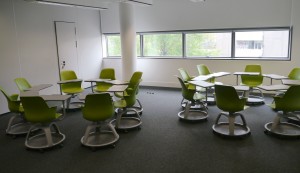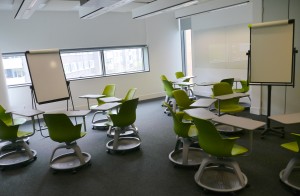Contents
- Looking for creative teaching activities? Encourage students to work collaboratively and motivate each others learning, to clarify their understanding of course content and reflect on different peer perspectives. Take a look at the group work suggestions in our series of blog posts. We recommend booking City’s new Learning Spaces to run these activities.
- 1) Debating
- 2) Group presentations
Looking for creative teaching activities? Encourage students to work collaboratively and motivate each others learning, to clarify their understanding of course content and reflect on different peer perspectives. Take a look at the group work suggestions in our series of blog posts. We recommend booking City’s new Learning Spaces to run these activities.
1) Debating

Why? Improves presentation and research skills. It develops students’ critical thinking in an engaging manner whilst giving them the opportunity to organize their thoughts around the discussion. You can use the ideas and arguments from the debate to lead into your lecture, or review key concepts at the end of the class.
Technique; Split the group into two teams. Give each team a motion to argue for and against. Give them time to work on their arguments. Assign 3-4 speakers in each team. The first speakers will introduce their teams opening arguments. The 2nd speakers will then in turn outline 2 or 3 more of the teams’ ideas in greater depth. The last speakers will then criticise the points made by the other team. Each speaker can speak for a short set amount of time with breathers at the beginning and end. The rest of the team can call out ‘point of information’ and with the speakers permission they can stand and make their point. You, the moderator, can put forward provocative questions whilst not expressing judgement on either side until the end of the debate.
Technology; You could book out ipads to hand out to students during the session to research their given topic or suggest that they use their own mobile devices.
Online suggestion; You may want students to practice a debate online, within a module discussion forum or wiki and then deliver the debate in class. Alternatively the whole debate could take place within a discussion forum. This may be a good way of getting students used to debating before introducing it into a session.
Tips; Click here for guidance for first time debaters.
Favourite room for this activity; D222 (22 seats)

2) Group presentations

Why? It helps students to fully explore topics whilst improving metacognitive skills. Improves presentational and research skills as well as being confidence building.
Technique; Present students with a ‘big question’ that you would like them to deliver a group presentation on. Divide them into groups and give them a time limit. Provide them with resources, e.g. ipads, videos, essays, books. Suggest that they assign roles with their groups, such as leader, designer, writer, spell-checker.
Technology and Equipment; Hire out some ipads for students to research their topics during class. Suggest that students share ideas using the ‘write on’ squiggle glass (where available).
Online suggestion; With the students permission, you could try recording the students presentations using lecture capture. This would give students the opportunity to play back their presentations at a later time to reflect on their work and presentation style. You could also ask them to prepare for the presentation via a wiki or discussion forum on Moodle and submit the groupwork via the group assignment option.
Favourite room for this activity; A214 (30)

Details of recommended learning spaces for these activities are found below;
- Rooms with tables and chairs with castors and squiggle glass: A109 (35), A214 (30), AG08 (40), B307B/C (70), BLG08 (32), BM02 (25), BM03 (25), C340 (50), D104 (60) and E212 (60)
- Collaborative style lecture theatre seating with squiggle glass- BLG07 (65) has fixed swivel seating
- Learning rooms with Node chairs and squiggle glass: A112 (16) and D222 (22). AG24B (25 – SHS only).
- Computer room with round cluster tables and moveable seating and squiggle glass: AG24A (30PCs – SHS 2-week booking priority).
Tip for group work! Try out some effective stop start strategies to easily end discussions and bring the focus back to you, i.e. hand signals, audio prompt, timer on the board or arrange the discussion so that the discussion can end in time for a break.
For more ideas on group work activities in flexible learning spaces visit http://tinyurl.com/LSgroupwork.
References
This blog draws on the following works:
Surgenor, P. (2010) Teaching Toolkit in UCD Teaching and Learning Resources [online] Available from: http://www.ucd.ie/t4cms/ucdtlt0021.pdf (Accessed 02.05.14)
Quigley, A. (2010) Top Ten Group Work Strategies in Hunting English [blog] Available from: http://www.huntingenglish.com/2013/01/12/top-ten-group-work-strategies (Accessed 02.05.14)
University of Waterloo, n.d. Group Work in the Classroom: Types of Small Groups [online] Available from: https://uwaterloo.ca/centre-for-teaching-excellence/teaching-resources/teaching-tips/developing-assignments/group-work/group-work-classroom-types-small-groups (Accessed 02.05.14)

